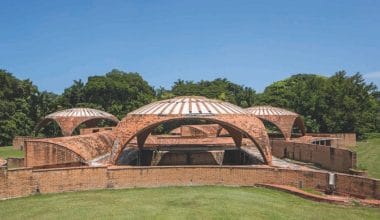One of those careers that help law enforcement agents answer some mind-boggling questions of ‘what exactly happened’ and ‘who is responsible’ is Forensic Science.
You will literally be digging for tiny pieces of detail and solving dark puzzles. So, you need to attend the best Forensic Science college.
Many mysterious deaths and horrifying acts of violence are committed by serial killers
So the services of Forensic scientists have over the years helped the police, detectives, and other law enforcement agencies track and apprehend these villains.
This article will guide you to know the top forensic science colleges that you may consider to become a crime scene investigator.
Meanwhile, below is our table of content.
Our Ranking Factor
We understand there are lots of options available to students who wish to pursue a career in forensic science. This might make it difficult for them to really know which is the best to select from the many options. To help you make your best choice from this list, we have filtered these schools here to meet your personal education needs.
The basis for ranking these schools is home-grown. We developed this ranking system from the research we conducted and thus we found these schools worthy to be listed here. The ranking system is based on the following indices:
- The number of programs offered: Students want to attend schools where they can find as many programs as possible.
- Accreditation: We consider if the school has been accredited to offer the programs.
- Acceptance rate: The lower the acceptance rate, the better the school
- The student-to-teacher ratio: In our ranking system, we also consider the number of students allocated to one teacher. We believe the lesser the number of students to a teacher, the more results that will be recorded.
- Graduation rate: We analyze the percentage of students who start and complete their degrees.
- Other site ranking: We incorporate data from other site rankings like; Us News, QS rankings, etc.
- Employability Index: We also consider how valuable the graduates of the schools are in the job market after graduation.
What is Forensic Science?
Forensic science is the application of scientific principles and techniques to matters of criminal justice which usually involves the collection, examination, and analysis of physical evidence at crime scenes.
In other words, it is the application of the methods of the natural and physical sciences to matters of criminal and civil law.
The word forensic science is the combination of two different Latin words: ‘forensic’ which basically means a public debate or discussion often done in law courts. The second word is the Latin word ‘Scientia’ which means “knowledge”
Usually, Forensic science is employed in the investigation and prosecution of crimes such as rape, murder, and drug trafficking.
This can also be employed not just in matters in which a crime has been committed but in situations in which someone is charged with a civil wrong such as willful pollution of air or water or causing industrial injuries or illegal dumping of refuse.
Types of Forensic Science:
Just as it has been said, forensic Investigators will look at samples like blood, fluid, fingerprints, residues, hard drives, computers, or other technology to establish how a crime took place.
This is a general definition, though, since there is forensics. Students who wish to pursue degrees in forensic sciences have a lot of options available to them to choose from. Below are the various forensic sciences you may consider.
- Document examination
- DNA analysis
- Digital/ Cyber Forensics
- Crime Scene Forensics
- Psychology
- Archaeology
- Fingerprinting
- Autopsy techniques
- Engineering
- Linguistics
- Anthropology
- Pathology
- Economics
- Accounting
- Entomology
- Toxicology
Who is A Forensic Scientist?
A Forensic scientist is one who has been trained to collect, preserve, and analyze samples of evidence of crime from crime scenes in order to find out the cause of death and who may have been responsible for it.
While some forensic scientists travel to the scene of the crime to collect the evidence themselves, others just do their own part in the laboratory, performing analysis on objects brought to them by colleagues from the field
Aside from collecting those samples from crime scenes, forensic scientists also stand before courts to interpret their test results and testify as expert witnesses to either defend or prosecute the accused.
Why study Forensic Science?
I wouldn’t know why you want to pursue a career in forensic sciences but whatever it is, let it be that it is driven out of passion and personal love for the profession else you may have a hard time in the career.
This is a hard truth you may find nowhere else. Honestly, criminal and forensic science, though rewarding, is not nearly as glamorous as it appears on TV and you would really require a special temperament to cope with it.
Yes, though quite demanding, forensic science is rewarding. Because of the increase in crimes around the cities, the services of forensic experts have increased. Forensic experts help police, detectives, criminologists, and other law enforcement agencies find perpetrators of crimes.
Forensic science programs will teach you how to “listen to the dead.” Both crime scenes and crime victims can provide you with clues about what happened, how it happened, when it happened, and: who did it.
You will learn how to examine trace details such as skin, hair, and clothing fibers, as well as DNA, blood, and fingerprints and, with a murder investigation, wounds, patterns of blood loss, and the amount of decay.
You will learn how to analyze these in order to reconstruct an accurate scenario and determine who did the crime. However, remember forensic science is not just about murder investigations; the skills you learn will also help you determine whether a crime was committed.
What do Forensic Scientists do?
The work of forensic scientists is basically done at the site of a crime where they collect samples of evidence of a crime and help to find out what happened and how it happened.
In a clear summary, listed below are some of what forensic scientists do;
- Cooperate and collaborate with federal and state law enforcement
- Secure crime scenes to ensure that the evidence is not tampered with or contaminated
- Take careful measurements of each scene they come across
- Photograph all pieces of physical evidence, making sure to include a scale to know the exact size of the object being photographed
- Document and preserve all pieces of physical evidence
- Attend and photograph autopsies
- Maintain lab equipment and field equipment
- Testify in court in regard to the evidence they collected at the crime scene
To learn more about forensic scientists read our article on crime scene investigator education.
List of Best Forensic Schools
Listed here are some of the best forensic science colleges in the United States. Plenty of these schools offer degree programs in forensic sciences. You will find bachelor’s programs, master’s, and doctoral programs in almost these schools. So take your time and explore these schools for forensic programs you might be interested in.
- Boston University
- University of Pennsylvania
- George Washington University
- Saint Louis University
- Texas A & M
- Loyola University
- Syracuse University
- Virginia Commonwealth University
- Drexel University
- George Mason University
- CUNY John Jay College of Criminal Justice
- St. Mary’s University
- University of Texas
- Ohio University
- Hofstra University
#1. Boston University
Boston University has one of the top forensic colleges where you can pursue your degree. The school has been accredited by the New England Commission of Higher Education (NECHE). The school offers a Master’s degree in Forensic Anthropology and Biomedical Forensic Sciences.
These programs train and equip aspiring and mid-career professionals in a variety of forensic disciplines applied to crime scene investigation and evidence analysis. Professionals trained in these disciplines are crucial to today’s comprehensive forensic investigations.
The program is designed to train individuals in the theory, practice, and methods of biological and skeletal anthropology employed by forensic anthropologists in medicolegal death investigations.
Students pursuing this program will receive extensive training in osteology, forensic anthropological techniques and procedures, forensic anthropology field methods, biological anthropology theory, taphonomy, mortuary archaeology, human anatomy, crime scene investigation, and methods of human identification.
This full-time, 42-credit Master of Science degree offers students a unique opportunity to apply the principles of anthropology, anatomy, and osteology to establishing biological profiles, excavation of remains, criminal casework, and other scenarios with unidentified remains.
This program is one of the few graduate forensic anthropology programs in the department of anatomy at a major medical center. This setting provides students and faculty access to extensive resources and facilities, including a human gross anatomy laboratory.
Completing these degrees will qualify graduates to work as forensic scientists, DNA analysts, chemists, death investigators, and crime scene responders at the local, state, and federal levels.
#2. University of Pennsylvania
If you’re ready to turn your interest in forensic science into an exciting career, the University of Pennsylvania will provide you with a strong foundation in this specialized field. You will receive an outstanding education with UPenn’s comprehensive and nationally ranked bachelor’s forensic science degree program.
In the Forensic Science Bachelors Programs, you’ll learn from faculty scholars and skilled professionals with extensive career experience. Their goal is to introduce you to the major functions and operations of the criminal justice field and examine various methodologies and applications used in forensic science.
Some programs you will offer are courses like:
- Criminology
- General criminal justice.
- Homeland and international security.
- Law and justice.
Students will not just have access to only bachelor’s programs but will also have access to graduate forensic science degree programs.
The Master’s program in Forensic Science at Penn State University is an exciting and innovative curriculum that offers students advanced, hands-on training in crime scene investigation techniques and crime laboratory methodologies. State-of-the-art crime scene training facilities and crime laboratories are used to train students in the practices of modern forensics.
Graduate students can take a variety of forensic courses in other disciplines such as anthropology, criminal justice, entomology, geology, and meteorology in order to shape the curriculum around their particular interests.
Students are also educated on the role of forensic scientists in the criminal justice system through direct exposure to courtroom proceedings and interaction with forensic experts, criminal lawyers, defense attorneys, and police investigators.
The formal degree received upon completion of the program is a Master of Professional Studies (MPS) in Forensic Science. Graduates of the MPS in the Forensic Science program at Penn State will be attractive candidates for jobs in law enforcement, forensic science, and criminalistics communities.
Check Out: 13 Best Animation Schools in California
#3. George Washington University
George Washington University’s Department of Forensic Sciences is one of the oldest and top forensic programs in the country. It offers advanced study in a crime scene and forensic investigation, forensic chemistry, and forensic molecular biology.
The school is one of the best colleges for forensic science that offers about six programs. In the GW Department of Forensic Sciences, challenging science courses are just one part of their comprehensive approach to learning.
Students learn through mentorship in the lab and through hands-on projects. From identifying chemical compositions to tracking bullet casings to performing bloodstain analysis, students are equipped with all the technical skills necessary to succeed in the forensic science workforce.
Some programs offered by George Washington University are crime scene investigation, forensic chemistry, forensic molecular biology, and forensic investigation.
Students can also find Graduate Certificate programs in Forensic Investigation which are designed for forensic sciences professionals who want to enhance their credentials and advance their careers.
#4. Saint Louis University
Saint Louis University is another school on our list of the best forensic colleges to get the best of your stay.
At Saint Louis University, you can be confident that you’re getting a world-class education. The Forensic Science Laboratory at Saint Louis is a 1,000-square-foot teaching and research lab with the latest hardware, software, and safety equipment, as well as materials used in the application of forensic anthropological techniques.
Each spring semester, the lab hosts a crime scene investigation course. The program also hosts a Forensic Science Club that offers forensic-related activities and exploration.
It might interest you to know that the forensic science majors offered at St.Louis university have been accredited by the American Academy of Forensic Sciences, enabling graduates to compete on a national and global level.
The program requires 77 credit hours divided among the science and social science disciplines, including biology, chemistry, physics, mathematics, sociology, and anthropology.
Generally, Saint Louis University offers nearly 90 undergraduate programs and over 100 graduate degrees that are challenging and relevant in today’s changing world, many with concentrations, minors, and certificates that allow you to have a truly personalized college experience.
See this list of Top 19 Online Bachelor of Science in Nursing Degree Programs
#5. Texas A & M Forensic Science
Are you interested in applying life sciences that allow you to pursue a career in crime scene investigation? Texas A & M is the place to be! Texas A & M is one of the best forensic science colleges in the nation. With this degree, you will learn the basics of collecting, preserving and using evidentiary information in problem-solving.
Forensic and investigative scientists undergoing training at Texas A & M rely on state-of-the-art scientific discoveries and technologies as tools to help them answer critical questions that are made available in a variety of settings.
There are currently two options available for the Bachelor of Science in Forensic and Investigative Sciences degree:
The Forensic Science Education Programs Accreditation Commission (FEPAC) of the American Academy of Forensic Sciences accredits this forensic science degree.
#6. Loyola University
Loyola University is one of the best forensic science colleges where students can pursue their degrees in this field. Students pursuing the BS in Forensic Science at Loyola University Chicago benefit from expert faculty and state-of-the-art facilities, preparing them for careers in a variety of occupational settings.
Loyola’s Forensic Studies program will develop and promote the skills needed for multiple career paths in forensics, including excellent oral and written communication skills, intellectual curiosity, use of interdisciplinary approaches, critical and analytical thinking skills, and commitment to lifelong learning.
Additionally, the Forensic Studies curriculum emphasizes the development of strong moral and ethical character, essential traits for success and leadership in the field.
The graduation rate at Loyola University is 90%. The overall rate of the Program is very good as rated by 4.65 out of 5.00.
Below is the employability index of Loyola University graduates.
- Working in the Forensic Sciences—37.0%
- Working in Science-Related Areas—15.1%
- Related Criminal Justice Areas—2.7%
- Working in Other Areas—8.2%
#7. Syracuse University
Syracuse University is a private school founded by the Methodist church in 1831. It is located in Syracuse, New York. Over the years, it has stood out as one of the top forensic science colleges.
The Forensic and National Security Sciences Institute at Syracuse is unique in its explicit linking of forensic science and national security in education, research, and outreach.
Syracuse offers an interdisciplinary major that includes forensic science with anthropology, biochemistry, biology, chemistry, physics, psychology, and sociology. The school offers its students a broad concept of forensic science theory and its applications.
Below is a list of interdisciplinary courses offered in forensic science:
- Genetics
- Criminology
- Forensic Toxicology
- Firearms & Impressions Evidence
- Forensic Chemical Analysis
- Bioarchaeology
Looking for sponsorship opportunities to study abroad, see this list of Fully Funded Scholarships – APPLY NOW
#8. Virginia Commonwealth University (VCU)
Located in Richmond, Virginia Commonwealth University (VCU) is a public, research-driven university that was initially founded as a medical college. Today it has not only medical degrees but has also offered over 200 programs in all fields.
The Department of Forensic science at Virginia Commonwealth University offers to kinds of degree programs: undergraduate and graduate programs.
The Bachelor of Science in Forensic Science at VCU is a unique program that recognizes that a solid science background, followed by strengthening of that earned knowledge through hands-on experience, are the keys to a successful forensic science career.
In the same vein, the Master of Science in Forensic Science program is designed to prepare students for careers as forensic scientists in government and private laboratories. Students here will receive in-depth exposure to specializations within the field, including drug analysis, DNA analysis, trace evidence, criminalistics, and legal issues.
VCU’s programs in Forensic Science have been accredited by FEPAC (Forensic Science Educational Programs Accreditation Commission).
See these: 13 Best Schools of Nursing in Canada
#9. Drexel University
Drexel University is another school on the list of best forensic science colleges. The school does not offer undergraduate courses in forensic science but has graduate programs you can opt in for.
The Master’s in Forensic Science program at Drexel University is designed to expose students to both the intricacies of problem-solving and the real-world application of forensic science. The curriculum provides students with a solid foundation within the forensic sciences while encouraging growth and leadership in new and emerging applications within the field.
The Forensic Science program is a two-year program that is completed with a minimum of 45 credits. Depending upon the concentration and student preferences, it may accumulate additional credits for graduation.
#10. George Mason University
George Mason University is a large research university and of course the largest in the state. It was established in 2009.
Over the years this school has been known for its outstanding feats and its outstanding performance as one of the top forensic science colleges.
George Mason’s College of Science offers full Bachelor’s and Masters’s degree programs in Forensic Science that prepare students for a range of career options. The strength of the faculty, breadth of course offerings, and broad clinical and professional skills experiences provide students with well-rounded forensic science education.
The forensic science program allows its students unequaled access to leading forensic science labs, corporations, government agencies, and non-profit organizations, and a unique opportunity to see forensic science in action.
After graduation, graduates of George Mason University can find career opportunities as Private Lab Examiners, Forensic Photographers, Forensic Anthropologists, Investigation Specialists, etc.
#11. John Jay College of Criminal Justice
The John Jay College of Criminal Justice is a senior and reputable forensic science degree college and an arm of the renowned City University of New York (CUNY). The university which is located in Midtown Manhattan was founded in 1964.
John Jay offers two main programs in forensic sciences: a master’s and a bachelor’s degree. The forensic science program at John Jay College provides a solid educational foundation in the theory and techniques necessary to master the laboratory sciences, field investigation, and expert testimony requirements of a successful graduate.
At the undergraduate level, students begin the major in their freshman year, learning chemistry, biology, and calculus, and proceed to advanced science courses in their sophomore and junior years.
In the junior year, undergraduates focus on one of three specialization tracks and learn to apply their knowledge in an undergraduate research project or external laboratory internship.
At the master’s level, students build on their undergraduate training in science by focusing on one of the three areas of specialization. Students offering master’s degree programs in CUNY will have to choose from any of the following options:
- Master of Arts in Criminal Justice
- Master of Science in Digital Forensics and Cybersecurity
- Msc Arts in Forensic Economics
- Master of Arts in Forensic Mental Health Counseling
- Master of Arts in Forensic Psychology
- Msc of Arts in Human Rights
- MA-JD in Forensic Psychology and Law (NYLS)
- MA-JD Forensic Psychology and Law
- MPA/JD Law and Public Accountability
- Master of Science in Forensic Science
The forensic science program at John Jay College offers specialization in criminalistics, molecular biology, and toxicology. Mastery in these specialties requires expertise in the areas of chemistry, biology, physics, and many other areas of scientific and mathematical knowledge.
#12. St. Mary’s University
St. Mary’s University is a catholic university found worthy to be on our list of top forensic science colleges. The Forensic Science Program at St. Mary’s provides students with rigorous academic preparation that includes a comprehensive foundation in the natural and physical sciences, criminology, and professional ethics.
Students also engage in forensic science research and internship opportunities that further prepare them to be highly proficient forensic science practitioners upon graduation.
However, as a liberal arts Marianist university, St. Mary’s commits to cultivating a spirit of social justice and service in our students as they apply their scientific knowledge and contribute to society as forensic science professionals.
Importantly, students who wish to pursue this career at forensic science college will have to take any of these programs:
- BS in Forensic Science with Chemistry
- BS in Forensic Science with Criminology
- A BS in Forensic Science with Biology
#13. University of Texas
The College of Natural Sciences at the University of Texas is one of the top largest forensic science colleges of science in the United States, with a community of over 12,000 undergraduate and graduate students.
Furthermore, at the University of Texas, students can offer programs that can lead to careers in crime scene investigation and related disciplines.
At the completion of their program, graduates of this course get career opportunities as crime scene investigators, forensic lab scientists, etc.
#14. Ohio University
Another top school on our list of best forensic science colleges is Ohio University. The program prepares the student to work in crime laboratories or other law enforcement agencies, such as FDA, OSHA, and EPA, or for graduate work in forensic chemistry, forensic science, or analytical chemistry.
Importantly, a forensic science degree from Hofstra prepares students for a wide range of careers in the public and private sectors, including law enforcement agencies, government labs, and private companies that specialize in varying types of forensic analysis.
Also, the forensic chemistry program is accredited by the American Academy of Forensic Sciences (AAFS) through the Forensic Science Education Programs Accreditation Commission (FEPAC).
Finally, the job and salary outlook depends on the career path a student chooses. About a quarter of our recent graduates reported average salaries of $ 60,000 a year or more.
#15. Hofstra University
Hofstra University is a private non-profit university located on Long Island, New York. Over the years Hofstra University has been competing with most of the already listed top forensic science degree schools.
However, Hofstra’s BS in Forensic Science program prepares students to work in the legal system. Hence, expect to take classes in an array of subjects while also completing an internship. Hofstra’s highly regarded internship program places students in career places like:
- CSI
- FBI
- CIA etc
FAQs on Best Forensic Science Colleges
For prospective forensic scientists, however, it may be advisable to complete a bachelor’s degree program in biology, chemistry, biochemistry, forensics, or a related field.
The states and districts that pay forensic science technicians the highest mean salaries are California ($88,090), Illinois ($85,690), Massachusetts ($79,200), Oregon ($76,970), and Alaska ($74,100).
Forensic Medical Examiners
Due to the increase in crime rate and criminals, the scope of Forensic Science is increased exponentially. There are lots of job opportunities in the field of Forensic Science
Conclusion
A career in forensic sciences will allow you to find career paths like crime scene investigators or detectives. Pursuing your program in any of the schools listed above will give you the best training you would require for your practice as a top-notch forensic scientist.
Reference
- Online Colleges that Offer Laptops and iPads FREE | LATEST UPDATE
- THE BEST COLLEGES FOR STEM DEGREES
- Top 30 Masters in Data Analytics Degree Program [SHARE]
- What Can I Do With a Fire Science Degree? Schools & Career
- 13 Best Fashion Schools in Canada
- What Does a Guidance Counselor Do? Career, Salary, & Job Descriptions
- Is Night School for High School Students Worth it?
DISCLOSURE: This post may contain affiliate links, meaning when you click the links and make a purchase, we receive a commission.






Comments are closed.